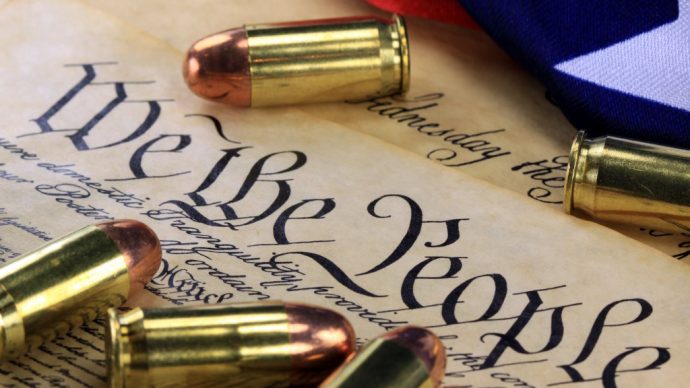Here’s Alan Keyes:
If we are to secure our right to liberty and decent self-government, it’s imperative that people read the Second Amendment and base their views on its words and logic. Instead they reason from whatever happens to be their own preoccupation, and use the result as an excuse to stand for or against gun control laws, 2nd Amendment rights, etc. But, as worded, the amendment is not simply “against government” or “for guns”. Its logic begins from the premise that “a well-regulated militia” is “necessary to the security of a free state.” Anyone familiar with the background its authors’ took for granted will realize that the word “state” is used in the sense of “condition, or state of being”, as in the phrase “state of nature”, which was used (for diverse purposes) by English theologians and political philosophers like Robert Filmer, Thomas Hobbes, Richard Hooker and John Locke.
Used in this way, the “security of a free state” refers to the human condition, and how human beings safeguard themselves and their belongings in light of its vicissitudes. In this respect, the naturally free condition of human beings is held to be a mixed blessing, ever inclined to produce a condition of violent injustice in which human individuals are hardly “free” in any objective sense. Hobbes famously described it as a condition in which the life of man is “solitary, poor, nasty, brutish and short.”
Though he takes a somewhat more optimistic view of its overall character, Locke sees that “the inconveniences of the state of nature… must certainly be great, where men may be judges in their own case…” He admits that, in the absence of civil government, whereby people in society are “subjected to the fair determination of the law”, the state of nature is a condition “wherein every the least difference is apt to end” in war.
But war is the state in which people must live constantly in bondage to fear, injustice and/or righteous indignation. Or else, without reference to justice and right, they are prey to a thirst for vengeance or self-satisfaction arising from some self-adjudged perception of disrespect to their persons or other belongings. According to Locke, a state of civil government, wielding powers derived from “the consent of the government” (i.e., their own individual commitment to lend themselves to a government instituted to uphold right), is therefore the only state that frees human beings from this oppressive bondage.
Read more: BarbWire

